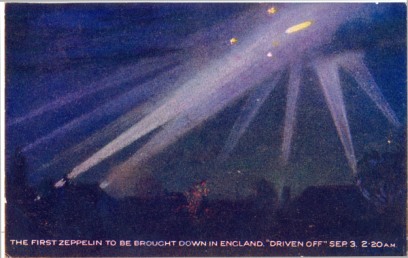Cumberland Council has now replaced the previous Cumbria County Council and 3 District Councils. The content on this website is still relevant including documents that may include the old county council logo. Find out about the council changes
Please update any cumbria.gov.uk browser shortcuts you may have to the new site pages as needed
War In The Air

Zeppelin Threat
by Denis Perriam
While it was said, "no bombing Zeppelin or Gothe ever attacked our peaceful backwater during hostilities," precautions were taken. Little appeared in newspapers, but the West Cumberland Times 2 June 1917 gave the text of a chat they had with W Burnyeat, of Millgrove, Moresby; "I observed that all the windows of byres and outhouses [on farms] were darkened by the same process as that recently applied to railway carriage windows so as to prevent any light being visible to a possible Zeppelin assassin."
Then in March 1915, the WC Times noted, "Farmers and occupiers of land are urged by the Food Production Department to see their property is insured against damage by aircraft or bombardment if it exceeds £500."
In the same month the newspaper, carried an advert inserted by Cockermouth Urban District Council warning of Daylight Air Raids', asking the public to listen for siren warnings "and shelter indoors until all clear."
There were complaints from MPs in the House of Commons over the "government's negligence and extravagance," in August 1919, in maintaining anti-aircraft stations at Longtown and elsewhere around the Gretna Munitions Works, some months after the Armistice. The editor of the Carlisle Journal said there were still 273 officers and 2,319 men manning anti-aircraft gun defences, which was a complete waste of money.
In his book on local aviation history from 1915 to 1930, Peter Connon says at the Solway anti-aircraft stations "all buildings were removed in April 1920."
While early winged aircraft did not have the range to bomb this area, it was realised that with Zeppelin attacks on London and the east coast in 1915, the Solway could easily be threatened by them. Evidence of the existence of such defences is not easy to find, but a letter sent by William Scott to Mary Burgess of the Cumberland News in 1964 gives some clues. During World War One Mr Scott spent four and a half years driving an Army Albion Lorry. When at Gretna and Mossband he said he "carried high explosives and towed searchlights and anti-aircraft guns to sites all round the coast."
On one occasion, Mr Scott said "We took a gun to Glasson and had to move the gatepost on the gate on Burgh Marsh to get the gun through, but as we had 30 sappers on board they soon made short work of that difficulty." Another time he "remembered towing a gun to Powfoot for night practice shooting at kites."
By November 1917 there were sufficient men to form an anti-aircraft team in the Gretna and District Football League, but from newspaper reports they did not play with much success. Censorship ensured there was no other press coverage of their activities, so we rely on what was said afterwards. At a dinner to welcome home demobilised soldiers and sailors at the Lindow Hall, Bowness on Solway, in September 1919, Major Lowther spoke: "When I came into the room, Mr Mitton reminded me that the last time he saw me was going about in Bowness looking for an airship." This was early in the war, the Major said, "when I joined the Westmorland and Cumberland Yeomanry and I was told to look for an imaginary airship." Looking in hedges and ditches, "having little idea at the time what a German airship looked like," he said, "we found nothing at all." While there was laughter at this, the Major added: "That was almost my first experience in the war and looking back it might have seemed rather childish, yet it was done very enthusiastically and I think that enthusiasm was one of the most salient points of what was known as the traditions of the British Army."
Another dinner, this time for ex-officers of the Cumberland Volunteers in May 1920, gave an opportunity for further reminiscences. "During the evening Major R C Chance gave an interesting resume of the history of the battalion," said the Journal: it was inaugurated on 20 April 1916 and was first known as the 1st Battalion, The Cumberland Volunteer Regiment." But, said Major Chance: "It was renamed the 1st Volunteer Battalion, The Border Regiment in June 1918." They were on active service in 1918, the Major said. "An anti-aircraft gun detachment took duty nightly at the Weatherhill Gun Station [one of eight such stations near the Gretna Munitions Works] and a number of volunteers joined a special service company for three months' duty on the coast defences in Northumberland." They also manned observation posts at Carlisle and Brampton.
With Zeppelins flying at 18,000 feet and above, there was little chance of ever hitting them. But on 2nd September 1916, the largest German assault by airships, using 16 vessels, took place on London and with bad weather they flew at lower altitude. In the air that night was William Leefe Robinson, a St. Bees Old Boy, who was a pilot in the Royal Flying Corps. He engaged one of the airships and brought it down at Cuffley where it burnt for five hours, with ammunition exploding.
This was the first enemy airship to fall on British soil and made Robinson a hero, and won him the Victoria Cross.
Years later, in 1937, Robert Baxter, a retired telephone engineer, recounted the danger to Carlisle. "During 1916," he said, "five Zeppelins approached the coast at Berwick……They picked up the line of railway leading inland to the Waverley route, approaching Riccarton Junction." The question was, he said: "Would they turn south and bomb the Gretna factory and Carlisle or northwards towards Edinburgh?" This was the nearest point to which enemy aircraft reached the city in the Great War, said Mr Baxter, "Edinburgh advising us that the enemy was dropping bombs along Princess Street."
It had been an anxious time in Carlisle, because while there was a blackout, factories on war work kept up production until the last minute, warned by telephone of an impending raid. Mr Baxter had to "impress upon the women telephonists that they must maintain their positions at the telephone switchboards without panic," which he said, "they did admirably."

